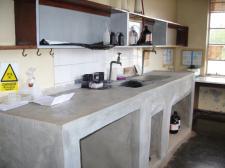You are here: Home » KIT Information & Library Services » ILS Information products » LABORATORY QUALITY STRENGTHENING
KIT Dossier Laboratory quality strengthening
Training programme focusing on system approach
KIT Biomedical Research has developed a training programme for laboratory managers and staff in which the quality of laboratory services is looked at from a system approach, in which input, process and output requirements are all considered to be important and determined by both technical and human factors. The training programme enables laboratories in resource-constrained countries to improve the quality of their service, even up to the level of accreditation or certification. The programme consists of a series of courses covering all aspects of laboratory quality management.
Course contents
The course takes a total of 4 weeks and is composed of 8 modules, a number of which can also be given separately:
- Basic principles of quality system management
- Standard Operating Procedures
- Internal auditing
- Risk assessment and safety in laboratories - a primer
- Process control and improvement
- Organizational management
- Managing Quality Systems
- Information management
The attendance of module 1: "Basic principles of quality system management" (or equivalent knowledge and experience) is a prerequisite for attending further modules.
An additional, follow-up module on Change Management will be available for those laboratories involved in a certification or accreditation process. This module should be planned for about one year after the start of the process.
An Example: Module 1 - Basic principles of quality system management
In a one week intensive course participants will be introduced to the basic principles of quality system management for diagnostic laboratories, gap analysis and needs assessment for improvement. Introductory lectures, combining theory and practical examples will be followed by exercises to assure that participants are provided with knowledge and tools that they can use in their own setting.
Learning outcomes / competencies module 1:
At the end of the module participants are able to:
- explain the concept of quality for diagnostic laboratories;
- analyse and discuss the various issues related to quality of their own setting with stakeholders;
- critically appraise their own laboratory setting and plan for appropriate improvement, even up to accreditation or certification
Learning methods
Introductory lectures, individual exercises, group exercises, computer-assisted exercises, plenary discussions, selected reading.
Assessment method
Students will be given case studies based on their working environment to analyse quality problems, to identify implications and critically describe and plan improvements. Participants analyse their own laboratory organisation and plan for improvement.
Internet support and information
The course is supported by an internet portal that provides background information on quality management. This portal is open to all people interested in quality issues.
Furthermore, all students have access to a password-protected environment with additional modalities, also beyond the duration of the course. This provides complementary practical tools such as formats and examples of quality handbooks, standard operating procedures and audit checklists. In addition, the portal offers an expert help desk function.
Credentials
Some comments from previous participants:
“At least now I know what quality is about”.
“I truly enjoyed the course! I have attended many lab trainings but never had a simple and clear quality management concept demonstrated like this one!”. Track record
In July and October of 2008 and in February of 2009 KIT Biomedical Research staff trained managers and personnel of various types of private and government laboratories, in different African countries.
Further information
Would you like to know more about this training programme or other products and services of KIT? Please contact Dr. Linda Oskam at l.oskam@kit.nl, tel +31 (0)20 566 5446 or refer to our website.
Snelkoppelingen
Agenda News Press Working at KIT About KIT Cookies Contact
Nederlands -English





